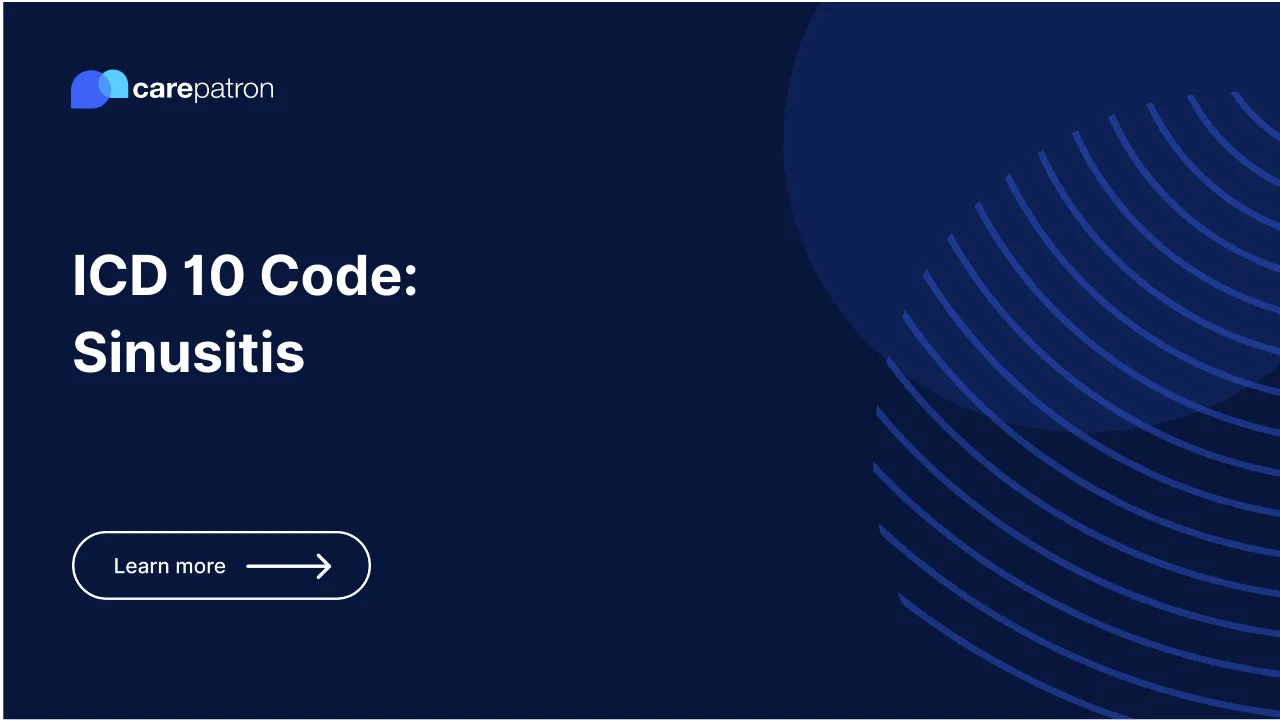Sinusitis ICD-10-CM Codes
Here are common ICD-10 Codes Used for Sinusitis diagnosis and classification, utilized to identify and track cases of sinusitis accurately.

What ICD-10 Codes are Used for Sinusitis
The ICD-10 codes used for sinusitis vary depending on the sinusitis type, the affected sinuses' location, and whether the sinusitis is acute or chronic. Here are some of the many Sinusitis ICD Codes;
J01.00
This sinusitis ICD 10 code is for acute maxillary sinusitis is a sudden inflammation of the maxillary sinuses, which are located in the cheekbones. Symptoms include a stuffy nose, facial pain, and a purulent nasal discharge. A bacterial infection often causes it, but a virus can also cause it.
J01.10
This ICD code is for acute frontal sinusitis is a sudden inflammation of the frontal sinuses, which are located in the forehead. Symptoms include a stuffy nose, facial pain, and a purulent nasal discharge. A bacterial infection often causes it, but a virus can also cause it.
J01.20
This ICD 10 sinusitis code is for acute ethmoidal sinusitis, a sudden inflammation of the ethmoidal sinuses, which are located behind the bridge of the nose. Symptoms include a stuffy nose, facial pain, and a purulent nasal discharge. It is often caused by a bacterial infection, but a virus can also cause it.
J01.30
When a patient has acute sphenoidal sinusitis, a sudden inflammation of the sphenoidal sinuses in the skull base. Symptoms include a stuffy nose, facial pain, and a purulent nasal discharge. A bacterial infection often causes it, but a virus can also cause it.
J01.40
This code is for acute pansinusitis (affecting all sinuses) is a sudden inflammation of all four pairs of sinuses. Symptoms include a stuffy nose, facial pain, and a purulent nasal discharge. A bacterial infection often causes it, but a virus can also cause it.
J32.00
This chronic sinusitis ICD 10 code is for chronic maxillary sinusitis is a long-lasting inflammation of the maxillary sinuses, which are located in the cheekbones. Symptoms include a stuffy nose, facial pain, and a purulent nasal discharge. A bacterial infection often causes it, but a fungus can also cause it.
J32.10
This ICD code is for Chronic frontal sinusitis is a long-lasting inflammation of the frontal sinuses, which are located in the forehead. Symptoms include a stuffy nose, facial pain, and a purulent nasal discharge. A bacterial infection often causes it, but a fungus can also cause it.
J32.20
This ICD 10 code for sinusitis is for Chronic ethmoidal. It is a long-lasting inflammation of the ethmoidal sinuses, which are located behind the bridge of the nose. Symptoms include a stuffy nose, facial pain, and a purulent nasal discharge. A bacterial infection often causes it, but a fungus can also cause it.
J32.30
This ICD 10 chronic sinusitis code is a long-lasting inflammation of the sphenoidal sinuses located in the skull base. Symptoms include a stuffy nose, facial pain, and a purulent nasal discharge. It is often caused by a bacterial infection, but a fungus can also cause it.
J32.40
Chronic pansinusitis (affecting all sinuses) is a long-lasting inflammation of all four pairs of sinuses. Symptoms include a stuffy nose, facial pain, and a purulent nasal discharge. A bacterial infection often causes it, but a fungus can also cause it.
Which Sinusitis ICD codes are Billable:
All of the ICD-10 codes mention for sinusitis are billable as long as the patient's medical record supports them.
Clinical Information
- Sinusitis is the inflammation of the sinuses, resulting in mucus buildup, pain, and pressure.
- It can be categorized as acute (lasting less than 12 weeks) or chronic (lasting more than 12 weeks).
- Viral or bacterial infections can cause sinusitis.
- Common symptoms include a stuffy or congested nose, runny nose with clear or colored mucus, facial pain, forehead pain, toothache, fever, cough, postnasal drip, sinus pressure, and a reduced sense of taste or smell.
- Treatment options depend on the type and severity of sinusitis.
- Acute sinusitis is managed with over-the-counter pain relievers, decongestants, and nasal saline sprays. Antibiotics may be prescribed in some cases.
- Chronic sinusitis may require prescription antibiotics, nasal steroids, or surgery for more comprehensive treatment.
Synonyms Include:
- Rhinosinusitis
- Sinus infection
- Sinus trouble
- Sinus headache
- Sinus congestion
- Sinus pain
- Sinus pressure
- Sinus drainage
- Sinus infection
.png)
Commonly asked questions
An ICD code for sinusitis is used to diagnose sinusitis, an inflammation of the sinuses. Sinusitis can be acute, meaning it lasts for less than 12 weeks, or chronic, meaning it lasts more than 12 weeks. There are many different types of sinusitis, depending on the affected sinuses and the cause of the inflammation.
Yes, sinusitis diagnosis codes are billable. This means that healthcare providers can use them to submit claims to insurance companies for reimbursement. The specific code that is used will depend on the type and severity of the sinusitis.
The treatment for sinusitis will depend on the type and severity of the infection. Acute sinusitis is usually treated with over-the-counter pain relievers, decongestants, and nasal saline sprays. In some cases, antibiotics may be prescribed. Chronic sinusitis may require more aggressive treatment, such as prescription antibiotics, nasal steroids, or surgery.






.webp)
.webp)
.webp)
.webp)
.webp)
.webp)
.webp)
.webp)
.webp)
.webp)
.webp)
.webp)
.webp)
.webp)
.webp)
.webp)
.webp)
.webp)
.webp)
.webp)
.webp)
.webp)
.webp)
.webp)
.webp)
.webp)
%2520(1).webp)
.webp)
.webp)
.webp)
.webp)
.webp)
.webp)
.webp)
.webp)
.webp)
.webp)
.webp)
.webp)
.webp)
.webp)
.webp)
.webp)
.webp)
.webp)
.webp)






.webp)
.webp)